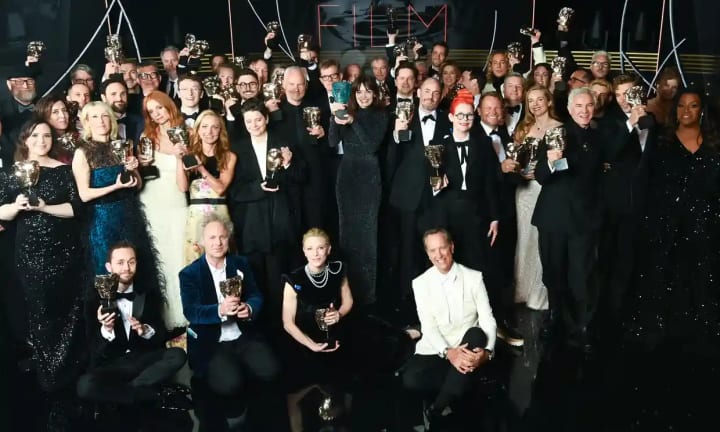Despite Asian representation, the Oscars still lack diversity
Why #OscarsSoWhite still applies to the upcoming 95th Academy Awards

It has been wonderful to see the boom in recognition of Asian narratives, actors and directors at the Academy Awards in recent years.
South Korean director Bong-Joon Ho stole the show in 2020 when he took home 4 Oscars for Parasite - 3 of which fell under the 'Big 5' Oscar categories (Best Picture, Best Directing, Best Original Screenplay). This set the ball rolling for further acknowledgement of Asian talent within cinema, with Chloe Zhao's Nomadland winning Best Picture in 2021 and Lee Isaac Chung's Minari snatching up 6 nominations; the following year, Japanese indie film Drive My Car earned 4 nominations and won Best International Feature Film; and if you haven't already heard, the incredible Everything Everywhere All At Once has rightfully swept up 11 nominations ahead of this year's Oscars, with Michelle Yeoh making history as the first Asian woman to be nominated for Best Actress.

This has been a step in the right direction for the world's biggest film awards ceremony in terms of promoting diversity and more accurately representing our increasingly diverse world; in 2020 the Oscars also introduced representation and inclusion standards which will come into effect in 2024 and will require films to follow certain inclusivity guidelines in order to be considered eligible for the Best Picture category. All positive movements.
However, for such a prominent and powerful platform in the film and entertainment industry, it's still not enough - here's why.
The racial disparity between nominees at the Oscars
2017 was a notable year for representing black actors and black narratives at the Oscars. Moonlight took home Best Picture and Mahershala Ali and Viola Davis both won for their supporting roles. Ali also won best supporting actor for Green Book in 2019 and Regina King for If Beale Street Could Talk. But since then, there have only been 3 black actors who have won for their roles and 11 who have been nominated. Out of these, there was only one winner for a leading role (Will Smith last year). To put this in perspective, in the same time frame there have been 8 white winners and 51 white nominees in the same categories, and awards for leading roles have gone to 5 white actors.

Also, this year, the recognition of black talent seems to have mysteriously dropped off - several films including and created by black people have been snubbed despite rave reviews; Till, Nope and The Woman King are all good contenders, but they weren't included. The 95th Academy Awards will also feature only 2 black nominees for supporting roles – Angela Bassett and Brian Tyree Henry – and there are no black nominees for any of the big five categories. In fact, it will be the first time since 2011 that there have been zero black nominees in the categories of Best Leading Actor/Actress, Best Directing, Best Screenplay and Best Picture. This can be damaging as it reinforces historical traditions in which marginalised groups were essentially forgotten about in Hollywood.
This year's choice of nominees has also revalidated the hashtag #OscarsSoWhite, which was first used by social media advocate April Reign in 2015 to spread awareness of the painfully obvious ethnic disparity at the world’s biggest film awards ceremony. The British Film and Television Awards also came under fire last week when all awards were taken home by white people – BAFTAs, I’m looking at you; you can’t just throw in a black female presenter and hold a performance by a black rapper at an overwhelmingly white awards ceremony and call that ‘diversity’.

Still a way to go before smashing the glass ceiling
As discussed at the beginning, I’m not dismissing the fact that the Oscars has been an incredible platform for promoting the work of marginalised groups and particularly Asian cinema in recent years - Everything Everywhere All At Once receiving a total of 11 nominations has thrown a well-deserved spotlight on Asian talent in film and this will open the door for so many who have felt excluded in the industry. As Ke Huy Quan proudly said after winning the award for best supporting actor at the SAG awards on Sunday:
"When I stepped away from acting, it was because there were so few opportunities... and now here we are tonight!"
It is also refreshing to see that there has been an increase in the number of Latinx nominees in recent years - Cuban-born Ana de Armas has been nominated for her role as Marilyn Monroe in Blonde this year and I was overjoyed at all the nominations that Alfonso Cuaron’s Roma received in 2019. But why are there only ever one or two ethnic groups represented in major Oscar categories at any one time?

I'm not the only one who has this concern - Kristen Warner, associate professor of performing and media arts at Cornell University has commented on how, despite the plethora of nominations for Everything Everywhere All At Once, the Oscars still has a way to go before breaking the glass ceiling: “One might be resolved to believe that meaningful diversity has finally arrived in Hollywood awards season, but I would caution that we are still on an incremental set of progressions that can still only favor one racial group at a time."
Some will argue the nominees have been selected because they deserve to be there over others, and while I agree that the line-up for best picture this year features some absolute masterpieces (personal faves include The Fabelmans, Triangle of Sadness, Everything Everywhere, Banshees of Inisherin), we have to consider that throughout history and even to this day the group of people selecting these films consist mostly of white, middle-aged men. In response to #OscarsSoWhite the Academy has made adjustments in recent years to increase its number of members who fall within underrepresented groups - now, 20% of the 2022-2023 Oscars board of governors are people of colour or of Asian descent - however, Julia Manson from The Review states that although this "is progress from years past, it's still a facet that could be improved upon."
How can the Oscars and film industry become more diverse?
In order for the Academy Awards to truly mirror the diverse world we live in, further changes need to be made to dismantle an industry originally constructed by white men. In order to do this, there has to be consistent efforts to make changes not only within the Academy but within the film and entertainment industry as a whole. The current lack of diversity reflects power struggles in society and film has a role to play in promoting the sort of society we want.
Film studios could ensure that they are a safe space for underrepresented communities by hiring more people of ethnic minority groups, along with higher numbers of women, people who identify as LGBTQ+ and people with disabilities. The lack of investment in films that have been produced by and feature members of marginalised groups (particularly women) also needs to be addressed - in 2021 a UCLA study found that women and people of colour find it more challenging to raise funds for films and that 68.8% of films with female leads had budgets below $20 million. In comparison, films with male leads were more than three times as likely to have budgets of over $100m. This discourages people of underrepresented groups to get their creative ideas heard, thus creating more disparity across the film industry.

Whilst we're on the topic of budget - another way to better incorporate diversity in films is through supporting independent cinema. In a previous article, I stated that the number of women and persons of colour was much higher amongst directors at independent film festivals than in mainstream cinema. Organisations representing indie films are also much more likely to be inclusive - over 70% of Film Independent's associates come from communities that are underrepresented and Independent Cinema Office aim to increase the diversity of their employees and Board of Trustee members by 2030 so that they can better reflect the ethnic diversity of the UK population.
The future

When it comes to the Oscars, maybe we have to accept that the steps to genuine inclusivity are slow and gradual. There have undoubtedly been improvements in comparison to a decade ago; but when there's talent from only one or two marginalised groups represented each year it feels like it's one step forward, two steps back.
I really hope in the coming years we see a wider variety of nominees from racial backgrounds and walks of life, particularly in the big five Oscar categories. It would also be great to see more LGBTQ+ films and actors included and as always there is definitely a need for more female directors.
As the oldest and most popular awards show the Academy Awards has a duty to use its platform to give a voice to those who have previously felt silenced and hopefully the new inclusion standards will have a lasting and meaningful impact. Everybody should feel able to tell their story through film - isn't that what movies are there for after all?
About the Creator
Dee Simone
I like to write, create, pet kitties, listen to owls, talk about life, watch indie films, laugh, make new friends 😊🐌🌻💋👾🧠⚡️🪐
✍️ www.medium.com/indiefilmsdee
📷 www.instagram.com/indiefilmsdee
🐦 www.twitter.com/indiefilmsdee






Comments
There are no comments for this story
Be the first to respond and start the conversation.